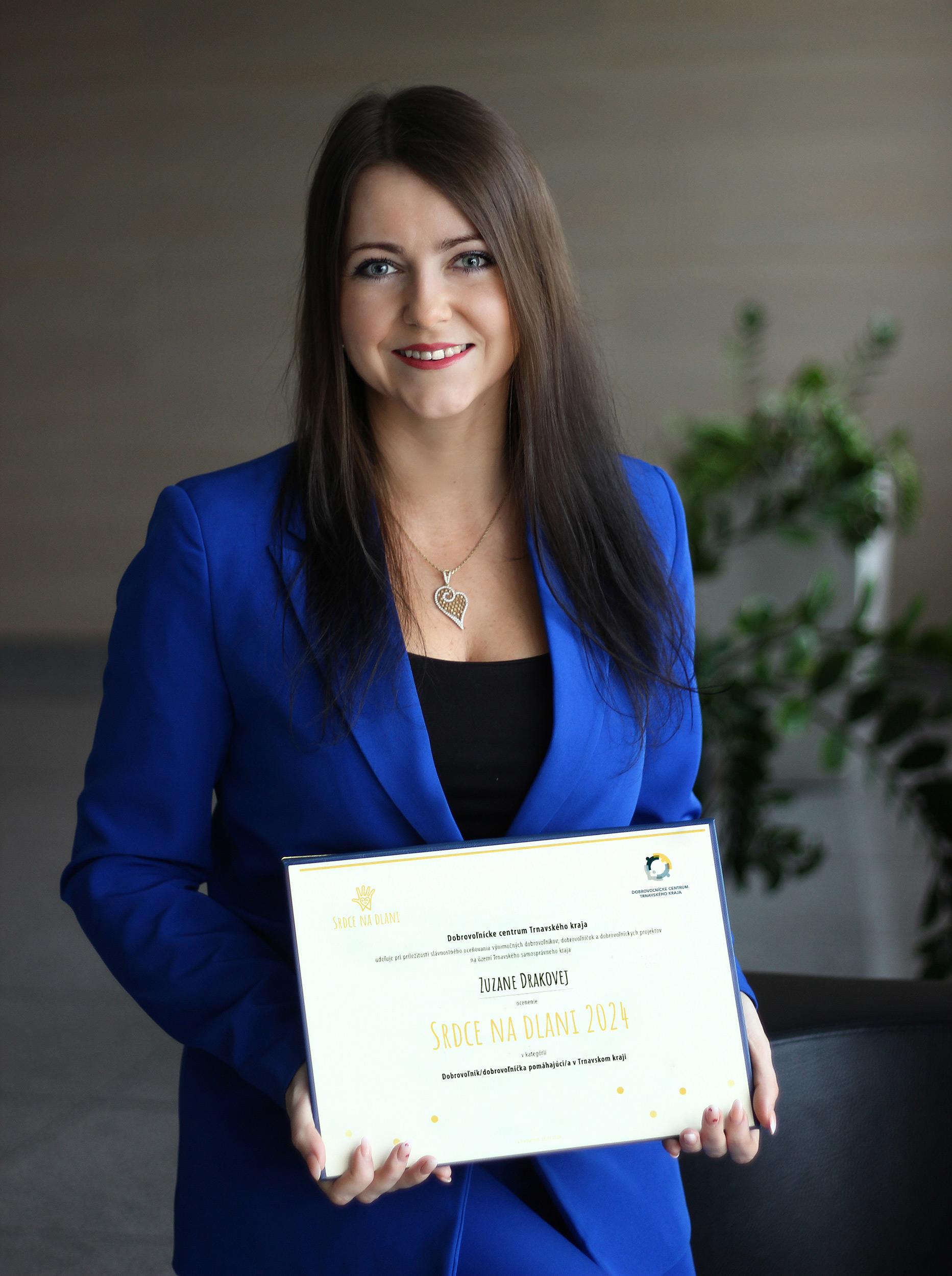
Zuzana Drakova, Vice-Dean of FSV: You have to experience volunteering for yourself, because you can't transfer the good feeling
Zuzana Drakova, PhD, is responsible for gender equality, but also for inclusion. But besides her academic duties, she always finds time for volunteer activities. She sees these not only as a service to others, but also as a way of personal growth.
Recently, you have won the Heart on the Palmaward for your volunteering activities, you have even advanced to the national round. How did you get into volunteering?
My journey to volunteering started at a young age when my parents introduced me to it, for which I am extremely grateful. I grew up in a warm and pro-social environment, where I drew the most inspiration from my parents' approach to their surroundings. They were never indifferent to the fate of people who were in an unfavourable life situation, so volunteering has been a natural part of my whole life.
While studying at university, I was actively involved in various volunteer activities of community projects aimed at helping disadvantaged groups. Gradually, I realized that through volunteering I could not only contribute to improving the lives of others, but also grow personally and gain valuable experience. Working in a university environment can be not only professional, scientific, but also deeply human.
What is the significance of the award for you?
The Heart on the Palm award is a confirmation for me that this journey is meaningful and motivates me to continue with other volunteer activities. Although volunteering is not always easy and requires a lot of time, energy and enthusiasm, this award is an encouragement to me and an imaginary commitment to keep on striving tirelessly and supporting those who need it the most. To advance to the national round amongst such inspiring people is a great honour for me and it is also a great blessing to belong to such a helping community of people who bring goodness to our society.
You have been involved in various fundraisers for people such as the elderly (How Much Love Can You Fit In A Shoebox). What volunteer activities are you currently doing or what are your plans?
On an ongoing basis throughout the year, I try to help wherever there is a need. At the national collection "How much love can fit in a shoebox?" I have been actively participating for six years. I am currently focusing on projects that promote intergenerational cooperation and inclusion. One of them is the initiative "How much love do you have in you?" It is aimed at connecting children with seniors year-round through joint activities, workshops and events where they can enrich each other's lives and exchange experiences and skills. It is a project that I see a lot of sense in because it creates magical moments and a really beautiful and deep bond, naturally leading children to volunteer in a fun way.
In March, together with friends, we are planning to clean streams in a village in the Trenčín region after the winter season. Environmental volunteering is a great psycho-hygiene for me, because it is time spent in the fresh air in nature, which I love. Every year I associate April with the national collection of the League Against Cancer - Daffodil Day, in which I actively participate. In the month of May, I am going to participate in the challenge "May love time - love blossoms at every age", which consists in creating handwritten greetings for seniors - clients of social services facilities. For the third year in a row, at the turn of December/January and May/June, I am tutoring a 13-year-old girl from an underprivileged family. Together we manage to achieve very good academic results, which is positively reflected in her report cards, which makes me and her parents very happy. In the future, I plan to expand my activities to other disadvantaged groups such as people with disabilities and create platforms for their integration into society. So there are really a lot of activities, I just struggle with lack of time sometimes.

Why do you think people gravitate towards volunteering?
People's motivations to get involved in volunteering are varied. Many are looking for a way to contribute to positive change in society and help those in need. Others see volunteering as an opportunity for personal development, to learn new skills or make new friends, but also to fill their free time. We must not forget the sense of fulfilment and satisfaction that comes with knowing that we have done something useful for others. But often volunteering is also associated with a strong faith.
What can volunteering give me as a person?
Volunteering does indeed bring a number of benefits. I always say that you need to "experience" it, to try the feeling "for yourself", because I am not quite sure if it is possible to describe it in words. But if I leave my undying emotions about volunteering for a moment, I can say that in addition to the feeling of satisfaction and fulfilment from helping others, volunteering allows you to develop communication and organisational skills, empathy and social sensitivity. It also provides an opportunity to learn about diverse life stories, which enriches our world view. And what I appeal to our students is that, last but not least, volunteering can also open doors to new professional opportunities and contacts.
Which area in Slovakia do you think needs the most volunteers?
There are several areas in Slovakia where the need for volunteers is significant. One of them is the care of the elderly, especially in the context of demographic indicators that predict an increasing number of seniors in our society, i.e. the ageing of the population and the many social and health challenges associated with it. Another area is the support of marginalised communities, where volunteers can contribute to improving living conditions and social inclusion. Equally important is the field of education, where volunteers can help children and young people from disadvantaged backgrounds to achieve better and develop their potential. But certainly our environment also deserves considerable attention, where there is also quite a lot of scope for volunteering activities.
"The persistence of gender inequalities is often the result of historical patterns and a lack of awareness."
You are also vice dean for gender equality and social issues. What is the main focus of your agenda?
As Vice-Dean for Gender Equality and Social Issues, I am the only Vice-Dean in Slovakia with such an agenda. I focus on the implementation and promotion of gender equality policy at our university. This includes creating conditions for equal opportunities for students and staff regardless of gender, age, ethnicity or social status. I also address issues of inclusion, diversity and support for disadvantaged groups in the academic environment to ensure that we provide an equitable and supportive environment for all members of our university community, as well as working towards the implementation of gender sensitive language.
I actively participate in international conferences where I present our results and also provide outreach in the form of talks, lectures or discussions with male and female experts and practitioners on the topic of gender equality. At the Faculty of Social Sciences of UCM I also act as an ombudsman for gender equality, i.e. I am a confidential person and in case of feeling of discrimination, disadvantage or harassment, not only students but also employees can turn to me or send me a complaint, which I always try to solve without delay.
As Chair of the Gender Equality Commission at UCM, I am involved in the development of the UCM Gender Equality Implementation Action Plan, as well as various statutes and other background documents. At the same time, I am also the sponsor of the University of the Third Age, for which I ensure the recruitment of new listeners, set up the schedule of lecture activities and try to create a safe space for the listeners of the University of the Third Age to feel accepted and listened to.
We are in the 21st century and I think that gender equality should have been resolved a long time ago, that it should no longer simply be an issue. Why are we still struggling with the problem of gender inequality?
We have seen progress in gender equality, but there are still persistent stereotypes that affect the perception of the roles of men and women in society. These deep-rooted attitudes are manifested in various areas such as the pay gap, unequal representation in decision-making positions or the unequal distribution of domestic responsibilities. The persistence of these inequalities is often the result of historical patterns and a lack of awareness of the importance of inclusive policies. It is therefore essential to continue to educate, create support mechanisms and work systematically to eliminate discriminatory practices.

What would help to make gender equality something we no longer have to deal with?
Education and awareness-raising from an early age is important, so that future generations naturally acquire the principles of equality and fairness. In my opinion, it is also necessary to promote equal pay, to create functional mechanisms to support women's career progression and to ensure equal opportunities in the fields of science, politics and business. The introduction of effective family policies, such as more affordable pre-school care or flexible working conditions, would also help. If we achieve these steps, gender equality will gradually become a matter of course and will no longer be perceived as a 'problem to be solved'.
On social issues, you are dealing with inclusion. In what areas do you help our students on this topic?
We strive to create an inclusive environment where the whole student body has equal opportunities for learning and personal development. We help students with disabilities by providing wheelchair access, adjusting timetables and individualised access to learning. We also support students from socially disadvantaged backgrounds by providing various scholarships. We also strive to actively involve international students and support their integration into the academic community. We often find that sometimes all it takes is a little help and a student will seize his or her opportunity.
"Volunteering provides an opportunity to learn about diverse life stories, which enriches our world view."
You studied social services and counselling and stayed on at school. Who do you think is the ideal candidate for this degree programme, and what are some of the possible career and personal attributes?
The ideal candidate or ideal applicant to study Social Services and Counselling should have a strong interest in helping others, an empathetic mindset and the ability to listen actively. Communication skills, patience and a willingness to work with vulnerable groups are also important. This degree programme is suitable for people who are open to solving social problems and want to be involved in improving the lives of individuals and whole communities. In terms of employment, graduates can work in a variety of fields - in social service settings, counselling centres, public administration or non-profit organisations. There is currently a great demand for qualified professionals in the social field, which makes this study a promising choice for future professionals.
In March, you can also see Vice-Dean Drakova at the discussion Evening University: gender (in)equality.